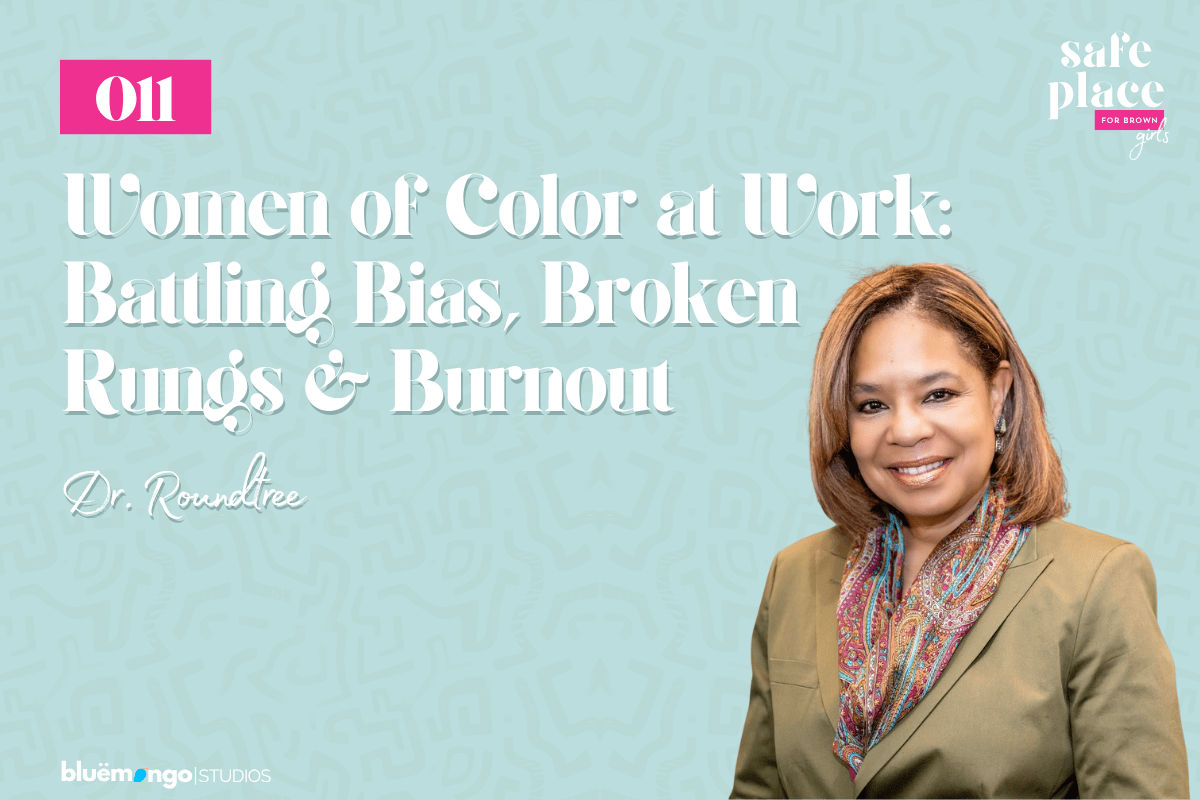Did you know that recent studies show Black women hold only 1.4% of C-suite roles? Latina women are also significantly underrepresented in these leadership positions.
Even when Black and Brown women reach these positions, we still face moments where we’re unseen, unheard, and mistreated because of our gender and race.
This feeling of being “othered” can make us feel like aliens in our own workplaces.
Why do we face these unique challenges? To gain a deeper understanding of this problem, I invited Dr. Deeawn Roundtree, a leadership coach and management consultant, to discuss the issue.
In our conversation, we explore how we can leverage our skills and find our voice to overcome these difficult situations.
This blog post dives into our conversation. You can stay here to read, or you can listen to our much-needed discussion on episode 11 of the podcast.
Three Hurdles Women of Color Often Face
During my research, I found that Black and Brown women often face three main challenges that contribute to a difficult work environment:
- Lack of representation and role models: This issue goes beyond just seeing people who look like you in high-level positions; it’s about having mentors and leaders who understand your specific challenges and can advocate for you.
- Microaggressions and implicit bias: These subtle but persistent forms of discrimination can have a major impact on a person’s mental and emotional well-being.
- Pay inequity and double standards: This is a financial and professional hurdle that can limit a person’s ability to thrive and build wealth.
These issues are often interconnected and rooted in systemic biases. As Dr. Roundtree states from her own experience, “We are undervalued. We are underutilized. We have stereotypes that are held against us. As women of color, we have that double jeopardy of being both black women and, of course, our gender. So, we are already behind the eight ball when we show up in the workplace…“.
The Impact of Underrepresentation
The lack of women of color in leadership roles is a serious issue that affects the entire workplace culture. It creates a difficult dynamic where women of color are often:
- Undervalued and underutilized: Their skills and contributions may be overlooked or downplayed.
- Subject to negative stereotypes: They are often judged based on stereotypes rather than their individual performance.
- Facing “double jeopardy”: They must contend with both racial and gender bias, compounding the challenges they face.
In response to these pervasive issues, Dr. Roundtree developed a leadership program specifically designed to empower women of color and equip them with the tools they need to succeed.
Learn more about her Black in the Boardroom Executive Coaching Program and how it can help you navigate this complex environment.
Overcoming Imposter Syndrome
The infamous psychological phenomenon of stepping into a position where you feel as though you’re not good enough. You know, imposter syndrome!
Dr. Roundtree described it as an “internal experience” where a person feels they are pretending to be more than they are.
This feeling, which can be particularly acute for women of color who face constant external scrutiny, can be addressed by building confidence from within.
For Dr. Roundtree, this meant pursuing higher education to earn the credentials she needed to feel confident in her abilities.
She recommends that women of color perform a self-assessment to identify any gaps in skills, education, or experience, and then work to fill them.
Taking proactive steps to improve your professional qualifications can help with feelings of inadequacy.
Microaggressions and Their Mental Health Effects
Another statistic I shared was on the mental toll that microaggressions take. Women of color are three times more likely to report experiencing “otherness” or disrespectful bias, which doubles their risk of burnout.
Dr. Roundtree believes that microaggressions occur because “our uniqueness is very apparent” due to physical traits like color and hair texture.
She explained that the mental health toll begins with a person’s internal self-perception. The key to thriving is to “take responsibility and control of our own self-worth, our own self-esteem, how we think about ourselves, our own mindsets, our own thoughts, being more intentional.”
For Dr. Roundtree, her faith is her anchor, and a strong spiritual foundation helps buffer her from the “superficial things that come at us.”
She concluded, “What defines me is what my Heavenly Father thinks and feels and says about who I am. That right there is going to protect us from a lot of the barriers.”
The Problem of Pay Inequity
Statistics show that, on average, Black women earn only 64% and Latinas earn just 54% of what white men earn.
Dr. Roundtree pointed out that this is not a reflection of a lack of education or effort, but rather a result of “structural inequality.”
While individual women cannot control the discriminatory practices of some companies, they can control their response.
Dr. Roundtree’s advice is to show up with excellence and professionalism and to seek opportunities elsewhere if a company’s pay structure is unfair.
She also stressed the importance of diversifying income streams to reduce reliance on a single employer.
Learning to Network in an Unkind World
Dr. Deewan Roundtree shares her knowledge and expertise in episode 11 of the podcast. There you’ll learn why black and brown women struggle in the workplace and why we’re often cast aside.
She also shares insights into her work and why she is so passionate about helping our community network in a world that is often unkind to us.
To learn more about Dr. Roundtree, visit her website here or reach out to her through email: droundtreeconsulting@gmail.com.

